

8th Fire: Wab’s Walk Through History. A 500-year-old relationship ... coming out of conflict, colonialism, and denial.
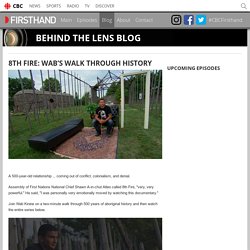
Assembly of First Nations National Chief Shawn A-in-chut Atleo called 8th Fire, "very, very powerful. " He said, "I was personally very emotionally moved by watching this documentary. " INDIGENOUS Guide 20161018 FINAL V4 Nov 15 WEB. Phyllis Webstad Orange Shirt Day Presentation. Residential schools.
The International Indigenous Policy Journal. Abstract Indigenous families are often perceived by teachers and school administrators as disinterested and uninvolved in their children’s education.
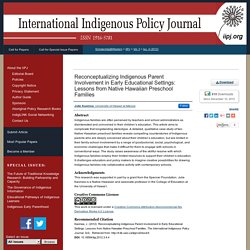
This article aims to complicate that longstanding stereotype. A detailed, qualitative case study of two Native Hawaiian preschool families reveals compelling counterstories of Indigenous parents who are deeply concerned about their children’s education, but are limited in their family-school involvement by a range of (post)colonial, social, psychological, and economic challenges that make it difficult for them to engage with schools in conventional ways. The study raises awareness of the skillful resolve with which Indigenous families employ their limited resources to support their children’s education. It challenges educators and policy makers to imagine creative possibilities for drawing Indigenous families into collaborative activity with contemporary schools.
Acknowledgments Recommended Citation Kaomea, J. (2012). Detail. Ctgc rs32. Elders in schools handbook en web. Changing the subject in teacher education: Centering Indigenous, diasporic, and settler colonial relations. Changing the subject in teacher education: Centering Indigenous, diasporic, and settler colonial relations Abstract.
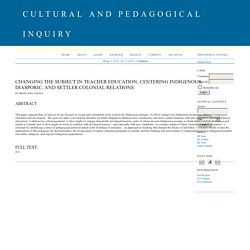
o05. Brochure. Working with aboriginal communities. Aboriginal Elders and Community Workers in Schools. Building Bridges with Aboriginal Communities. Genuine Involvement of Indigenous Families. Teaching for Indigenous Education. The following resources represent Indigenous perspectives on key learning ideas related to Aboriginal Family and Community Engagement.
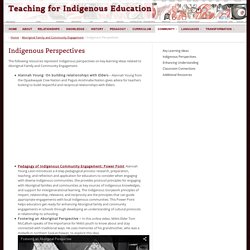
Alannah Young: On building relationships with Elders – Alannah Young from the Opaskwayak Cree Nation and Peguis Anishnabe Nation gives advice for teachers looking to build respectful and reciprocal relationships with Elders. DebMcGregor. PDF1 Stewards of the Future Complete Toolkit. State of aboriginal learning in canada final report, ccl, 2009. Place-Based Curriculum Examples. Math in Indigenous Weaving " Approximately twenty educators gathered at the Sitka Campus of the University of Alaska Southeast (UAS) in August 1999 for an Indigenous Curriculum Development in Science Institute.
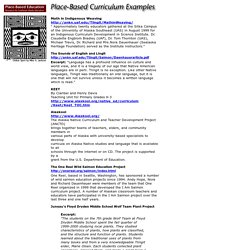
Dr. Claudette Engblom Bradley (UAF), Dr. Tom Thornton (UAS), Michael Travis, Dr. Kids Talk - Cultural Exchange, Part 3. Kids Talk - Cultural Exchange, Part 1. Kids Talk - Cultural Exchange, Part 1. Hatcher etal 2009 CJSMT Two Eyed Seeing classroom cconcepts approaches challenges. Barnhardt Kawagley. WW Teaching Ecological. Ww teaching ecological. Place-Based Education: The STAR 3-to-3rd Model. Early Science & Nature. Clever Apes 29 Nature and human nature. Place-Based Learning in Aboriginal Communities. Wncptool %20assessing validating. Oral tradition. Origin or Transformation Story. Origin or Transformation Story. American Indians in Children's Literature (AICL) Storytelling. CBC Aboriginal. Producer Dick Miller gathering sound Twenty original stories from northern Haida Gwaii were recorded, transcribed and digitally preserved for the Masset Haida Heritage and Repatriation Society, in 2005.
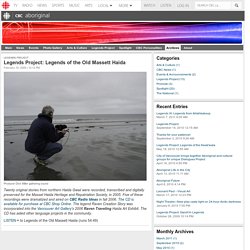
Five of these recordings were dramatized and aired on CBC Radio Ideas in fall 2006. The CD is available for purchase at CBC Shop Online. The legend Raven Creation Story was incorporated into the Vancouver Art Gallery's 2006 Raven Traveling Haida Art Exhibit. The CD has aided other language projects in the community. CBC Aboriginal. Stories from the Secwepemc of Salmon Arm, B.C. aired nationally on CBC Radio Ideas in March, 2006.
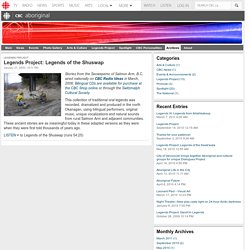
Bilingual CDs are available for purchase at the CBC Shop online or through the Switzmalph Cultural Society. This collection of traditional oral legends was recorded, dramatized and produced in the north Okanagan, using bilingual performers, original music, unique vocalizations and natural sounds from rural Salmon Arm and adjacent communities.
These ancient stories are as meaningful today in these adapted versions as they were when they were first told thousands of years ago. CBC Aboriginal. Norma Wadhams craddles a rattle (Leah Shaw/CBC) The Gwich'in Legends were originally broadcast on May 18, 2010 on Ideas on CBC Radio One.
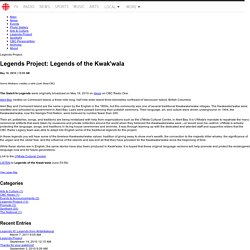
Alert Bay nestles on Cormorant Island, a three mile long, half mile wide island three kilometres northeast of Vancouver Island, British Columbia. Alert Bay and Cormorant Island are the name s given by the English in the 1800s, but this community was one of several traditional Kwakwaka'wakw villages. The Kwakwaka'wakw were resettled and schooled by government in Alert Bay. Laws were passed banning their potlatch ceremony. The 2003 CBC Massey Lectures, "The Truth about Stories: A Native Narrative" - Home. In his 2003 Massey lecture, award-winning author and scholar Thomas King looks at the breadth and depth of Native experience and imagination.

Beginning with Native oral stories, King weaves his way through literature and history, religion and politics, popular culture and social protest, in an effort to make sense of North America's relationship with its Aboriginal peoples. Thomas King holds a PhD in English/American Studies from the University of Utah and has taught Native Studies at Utah, California, Minnesota, and Alberta for the past twenty-five years.
17988 23565 1 PB. CBC Aboriginal. Learning Resources Evaluation Policy 2013. Oyate - Resources. As a companion to our previous publication, How to Tell the Difference: A Guide for Evaluating Children’s Books for Anti-Indian Bias, and to assist our own evaluative work, we have compiled these further criteria. 1) Does the author completely fabricate a story in the vague style of a Native legend?
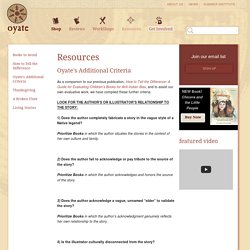
Prioritize Books in which the author situates the stories in the context of her own culture and family. 2) Does the author fail to acknowledge or pay tribute to the source of the story? Oyate - Resources. Buy your own copy here! How to Tell the Difference: A Guide for Evaluating Children’s Books for Anti-Indian Bias by Doris Seale, Beverly Slapin and Rosemary Gonzales explains Oyate’s very basic criteria for evaluating books about native peoples, or that engage Native themes. This book has been helpful to so many authors, parents and educators over the years that we believe we have helped raise our collective expectations, which in turn has enriched the publishing industry.
How to Tell the Difference was published in 2000 and the content is reproduced in A Broken Flute. Since then, we have continued to compile and clarify criteria to help us discern honest portrayals of our peoples in children’s books containing retellings of traditional Indian stories, as well as contemporary stories and representations of Native peoples. Bringing%20Metis%20Literature%20to%20Life%21. EFP%2010 11%20Teacher%20Resource%20Guide%20Final. Sharing the Seven Sacred Teachings Oct7. Walking Together. Detail. Metis oral tradition. Dr. Jo-Ann Archibald - On including Indigenous stories.
o02. Toulouse. Indigenous Principles Decolonizing Teacher Education: What We Have Learned. Indigenous Principles Decolonizing Teacher Education: What We Have Learned Kathy Sanford, Lorna Williams, Tim Hopper, and Catherine McGregor University of Victoria Website listing key Lil’wat learning and teaching concepts with pronunciation of associate terms in the Lil’wat dialect: Teacher education programs around the world are continually undergoing change; however, fundamental beliefs underpinning the programs have not significantly shifted (Phelan, 2011; Darling-Hammond, 2006). They still reflect hegemonic Euro-American-centric values influenced and shaped by neoliberal discourses of hierarchical models drawing from “expert” knowledge (Battiste, 2002) where competition, individualism, and scientific research have dominated educational thinking.
Conventionally, these areas compete for curriculum time in order to pass on expert knowledge to the novice teachers in form of course lectures, activities, and assignments. Decolonizing Teacher Education Lil’wat Principles Figure 2. Dr. Endnote. Principles of Kaupapa Māori. Principles of Kaupapa Māori. Deepening Knowledge to Inspire Action: Including Aboriginal Perspectives in Teaching Practice.
Deepening Knowledge to Inspire Action: Including Aboriginal Perspectives in Teaching Practice Angela Nardozi, Jean-Paul Restoule, Kathy Broad, Nancy Steele, and Usha James University of Toronto Author Note. Kaupapa Maori. ED523184. Article. Ab persp. Elder Elize Hartley talks about the 7 grandfather teachings of the Metis. Interview with Dr. Jo-ann Archibald. Teacher. CulturalStandards.
EFP%2012%20TRG%20April%2016%202008%20ALL. Early Learning Class Based Upon Aboriginal Culture. 5. 2007 redefining how success is measured en. Changing Results for Young Readers: Laura Tait, First Peoples Principles of Learning. Toulouse. Toulouse. Different Ways of Knowing the World. Aibscurrguide. Sorry, Kevin Rudd's Apology to "The stolen Generation" Indian Residential School Resources.
Statement of apology to former students of Indian Residential Schools. Ns residential schools resource second edition. o02. Infusing Aboriginal Content and Perspectives into Your Teaching. At OISE, we encourage all of our teacher candidates, graduates, and researchers to actively acknowledge the importance of the First Peoples of Turtle Island and to teach about their histories, cultures and perspectives to all students. This section contains resources to help you infuse your practice with the perspectives of Aboriginal populations.
Residential Schools. Bringing them home: separation of Aboriginal and Torres Strait Islander children from their families. Shi-shi-etko. Full circle first nations metis and inuit ways of knowing. SAVAGE. Ontario College of Teachers video - Voices of Wisdom: Learning from Elders. Truth and Reconciliation Commission of Canada (TRC) Shannen's Dream - School Resources. Jump to navigation. Reconciliation Canada. Walking Together. The Failure of Reconciliation — Taiaiake Alfred. IndigenousStorytelling Corntassel. Speaking My Truth. School%20Resources%20Kindergarten%20to%20Grade%202. Exploring reconciliation in early childhood practice Part 1 of 2. Exploring Reconciliation in early childhood practice Part 2 of 2. Detail. EDUCATING OUR YOUTH.